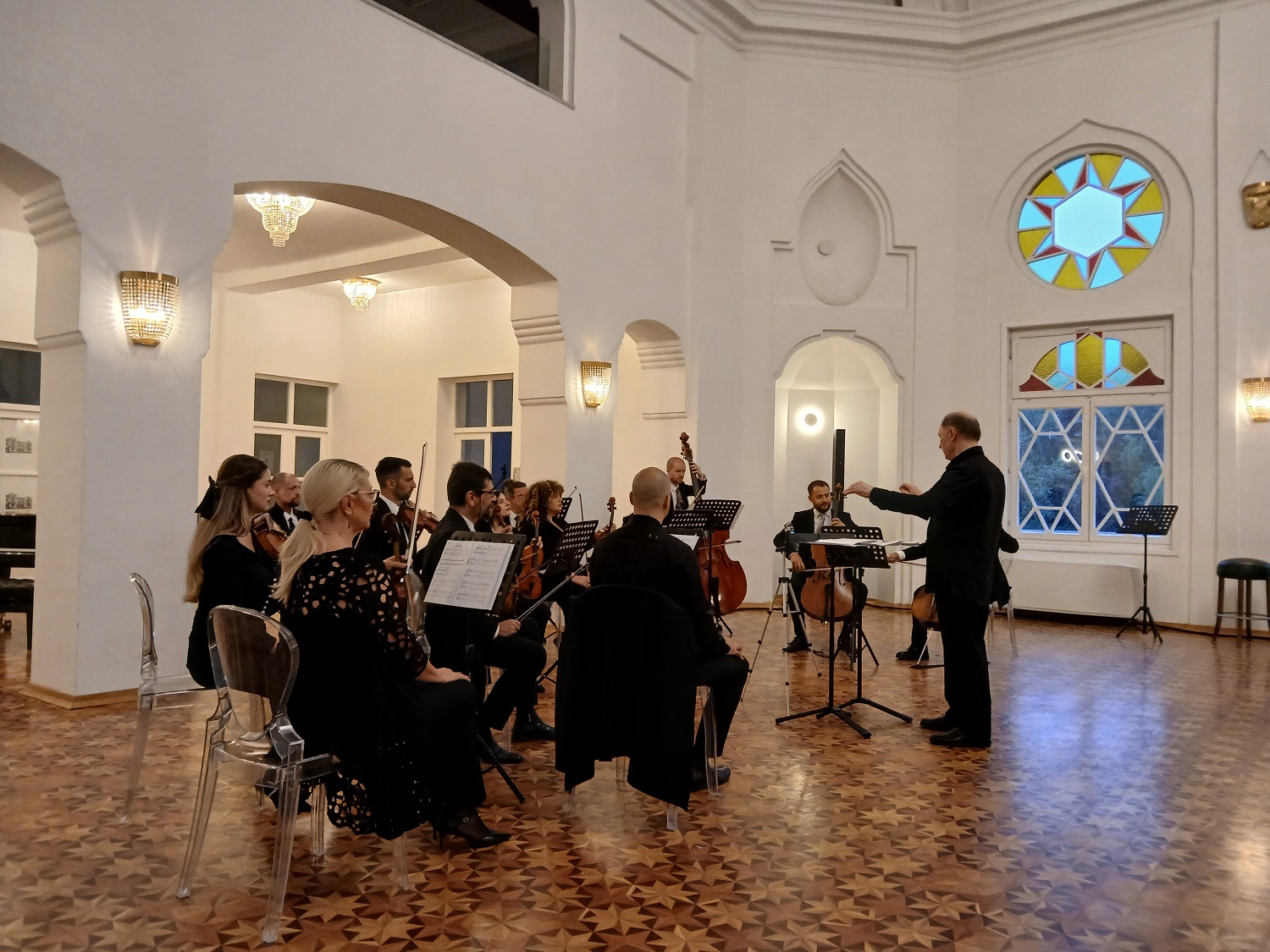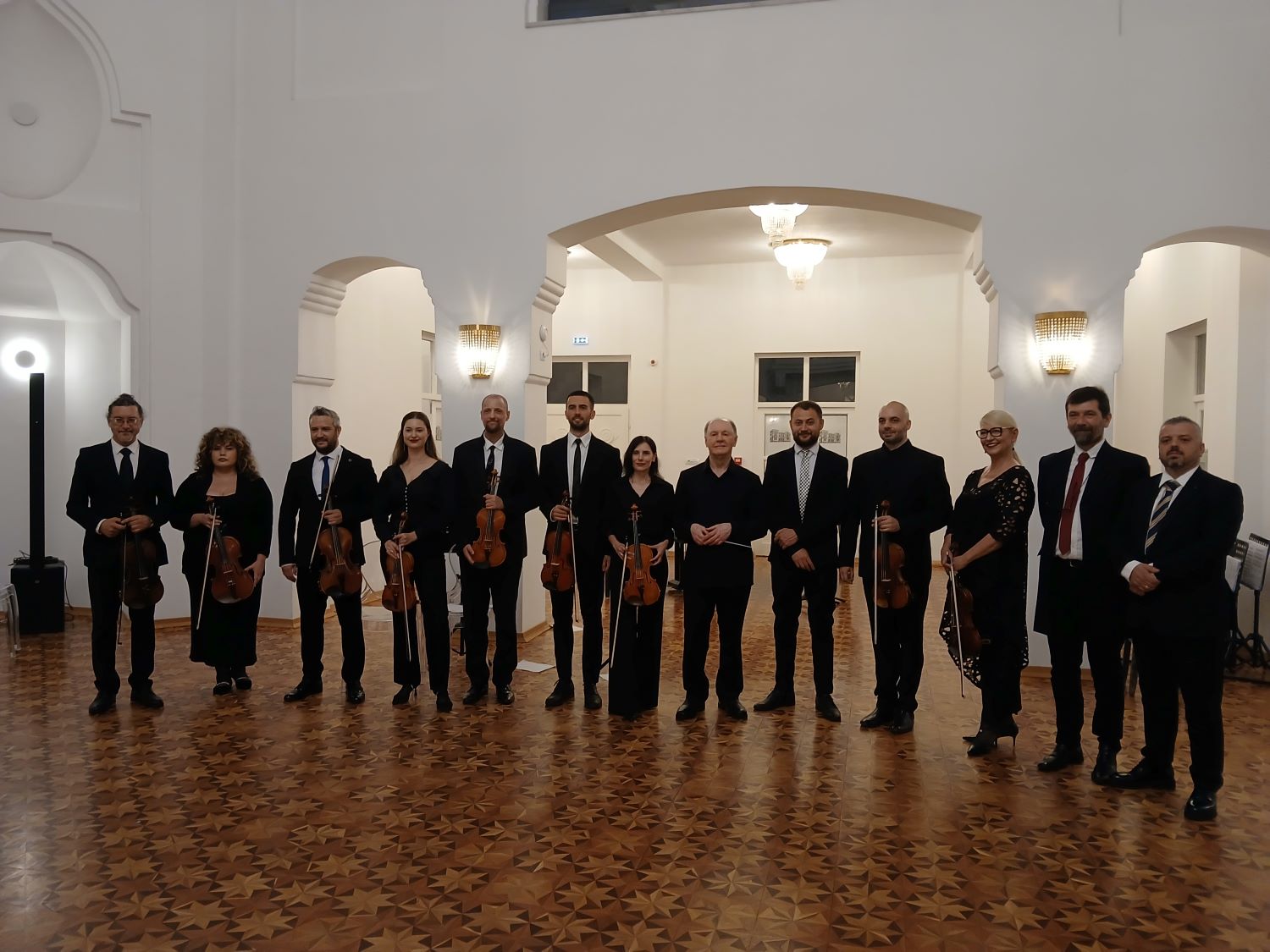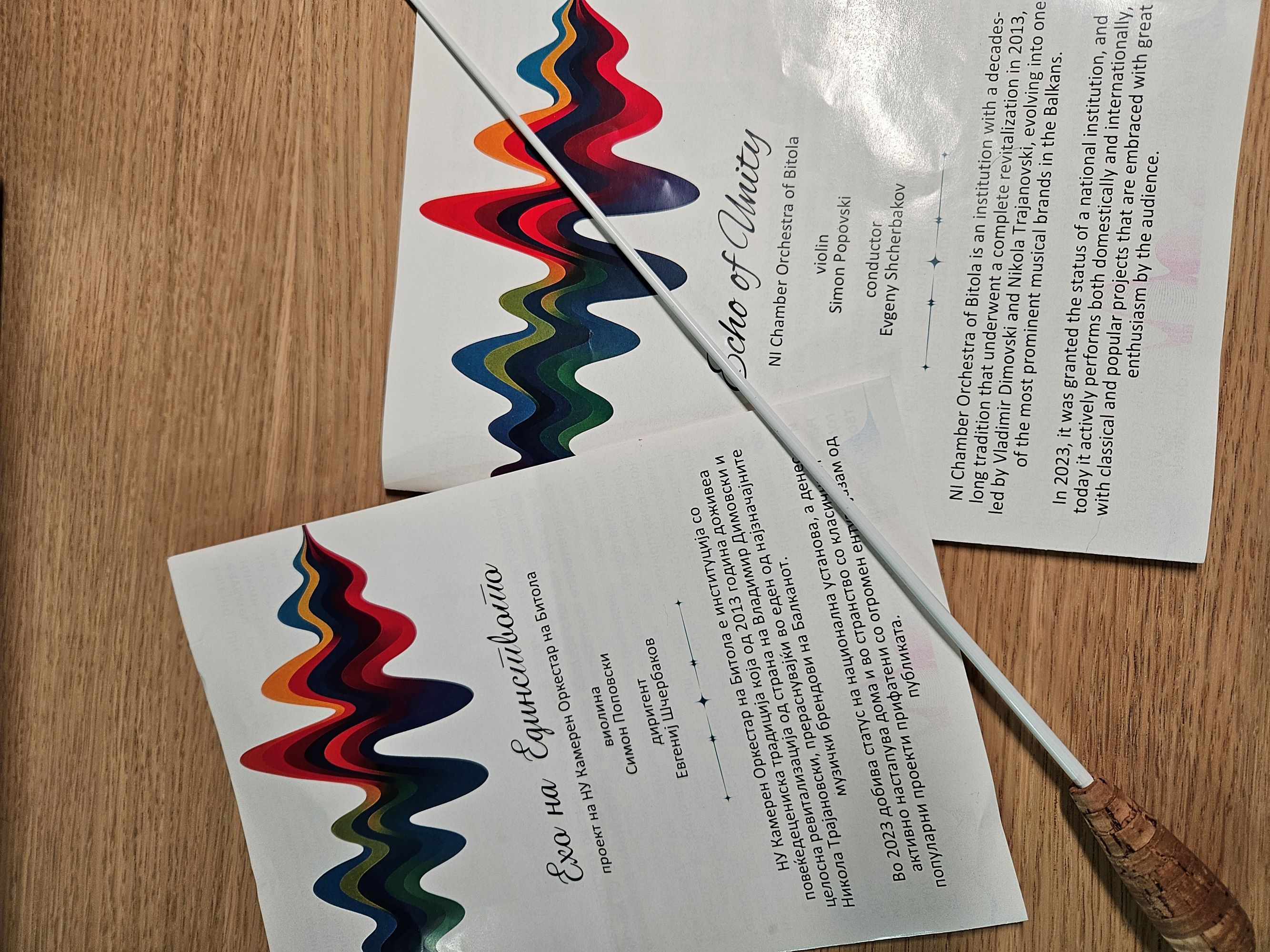News:
Last night, in a truly inspiring atmosphere, the NI Chamber Orchestra of Bitola, under the masterful baton of renowned Canadian composer and conductor Evgeny Shcherbakov, delivered an unforgettable musical experience. The concert, dedicated to contemporary works with a particular focus on modern Macedonian and Canadian composition, brought a bold, inspiring, and musically rich energy to the stage.
Under the direction of Maestro Shcherbakov, the orchestra displayed remarkable interpretative maturity and discipline. They skillfully navigated the specific expressive tools and compositional techniques of the modern idiom, embracing the challenges of contemporary musical language while allowing each work to resonate with authenticity and power.
With a steady hand and a clear musical vision, maestro Evgeny Shcherbakov led the musicians through intricate rhythmic and harmonic textures, drawing out subtle nuances and dramatic highlights that greatly enriched the audience’s sonic experience.
This concert marks a significant contribution to the promotion of contemporary Macedonian and Canadian music and stands as a testament to the artistic depth and growth of the Bitola National Chamber Orchestra. It deserves recognition not only as an outstanding artistic achievement but also as a cultural event that enhances the musical life of the city and beyond.
— Professor Juliana Proja Dimovski
State Music College, Bitola
May 25, 2025


"Heartfelt thanks to Maestro Evgeny Shcherbakov, who bravely led us in our musical journey filled with emotion, inspiration, and positive energy."
— Principal Cellist Ljupcho Milevski
NI Chamber Orchestra of Bitola
May 24, 2025
Due to numerous requests to hear what and how I was writing a very long time ago, I am posting now a recording of my recent and/or after forty years delayed publication of my work “Five Variations for Piano” performed by the brilliant pianist, Professor of the Saratov State Conservatoire, Mikhail Preobrazhenskii. Maybe one day I will post what I wrote fifty seven years ago.
I am heartbroken and outraged at the atrocities happening on the streets of a beautiful sovereign country of Ukraine. Today, we must stand in unity to support Ukrainian people and prevent the history from happening.
As a Russian-Canadian composer I condemn the attack on Ukraine and I hope more musicians and artists of Russian descent from across the globe will join me and speak out against it. Glory to Ukraine!

Nocturne by Evgeny Shcherbakov from Canadian Music Centre BC on Vimeo.
Thank you to the Cambridge Music Conference http://www.cambridgemusicconference.org/migration.html, the Canadian Music Centre BC https://musiccentrebc.ca/ and the Canada Council for the Arts | Conseil des arts du Canada

for providing me with an opportunity to continue to compose, perform and share my music with Canadian and World audiences during these unprecedented times!
Evgeny Shcherbakov (*1958)
Nocturnal Bells for Piano
Dedicated to the memory of Ross Alden on the 100th Anniversary of his Birth
If listen attentively to the silence of the night, it can be heard the melodious sound of the nocturnal bells. Where does this sound come from? From the depths of the ages or from the height of heaven? About what do they want to tell us? Do they want to recall the past or to warn about the future…?
I was thrilled to meet and work with the great colleagues from the professional conductor’s world and brilliant musicians of the Denver Philharmonic Orchestra!
Thank you to the Canada Council for the Arts | Conseil des arts du Canada for helping make it possible!




CMC 6/8/2019
Pianist Artur Nikulin and Composer Evgeny Shcherbakov
Morning Coctail, Dnipro, Ukraine, May 21, 2019
Press conference. Composer Evgeny Shcherbakov and Pianist Artur Nikulin Dnipro, Ukraine, May 20, 2019
CMC 4/19/2019
What Stars Keep Silent About
May 21, 2019
The Great Hall of the Dnipropetrovsk Philharmonic, Dnipro, Ukraine
Information
The World Premiere of CMC Associate composer Evgeny Shcherbakov's new work What Stars Keep Silent About will be performed by World renowned Ukrainian pianist Artur Nikulin in The Great Hall of the Dnipropetrovsk Philharmonic, Dnipro, Ukraine.
CMC, 11/15/2018
Evgeny Shcherbakov: Two New Works for solo piano
In Solitude: Midnight Moon and Loneliness (Video)
On September 28th and 29th, composer and pianist Evgeny Shcherbakov performed two of his new works for solo piano, In Solitude: Midnight Moon and Loneliness, at the 2018 Cambridge Music Conference at SFU’s Goldcorp Centre for the Arts.
Evgeny Shcherbakov writes as follows about In Solitude: Midnight Moon: “When I look at the moon, it seems that it is a human being, who as fate has willed, was immured into solitude. Even though the moon is surrounded by beautiful stars, she can never reach them. The moon weeps and silver tears are streaming down from her sad eyes into a very mournful, but beautiful melody. “ (please click here to view the video)
For the first time in Canada, on September 28 & 29, Evgeny Shcherbakov’s piano & eurythmy piece Loneliness (premiered at the 2006 Eurythmeum Zuccoli Commission, Dornach, Switzerland) was inspiredly performed by the composer in collaboration with exceptional Maren Stott from Eurythmy West Midlands. Of Loneliness, Shcherbakov writes: “What are the sounds of loneliness? We all experience this heavy and desperate feeling sometimes.” (please click here to view the video)
|
Waldorf piano accompanist and composer/conductor premieres masterpiece in Lviv, Ukraine
AWSNA, Waldorf Education, 5/25/2018
- You just never know who might be working at a Waldorf school. Take, for example, world-renowned composer and conductor Evgeny Shcherbarkov, from the Vancouver Waldorf School, whose latest composition received a standing ovation during its world premiere at the 2017 International Festival of Contemporary Music Yuri Lanyuk and Friends, in Lviv, Ukraine.
The festival at the Lviv Philharmonic is considered one of Europe’s centres for arts and culture and has gathered some of the finest and most prominent musicians from Germany, Ukraine, Austria, Switzerland, Great Britain, Canada and more.
In Memory of Boris Nemtsov Kyrie was conducted by the composer and performed by award-winning cellist and singer Emil Rovner (Germany), the Galician Academic Chamber Choir and Lviv Philharmonic Academic Symphony Orchestra, and was supported by the Canada Council for the Arts. For Evgeny Shcherbakov, who was granted a special leave by his school, it was a uniquely meaningful experience to be able to attend and conduct his own world premiere: "It was such an honor to me and great responsibility to be invited in Lviv, Ukraine to represent Canada as a Canadian composer and conductor," said Evgeny.
In Memory of Boris Nemtsov Kyrie has a profound and deeply dramatic meaning, as it reflects Mr. Shcherbakov’s deep sorrow, despair and feelings of helplessness towards the state of global international relations. This concerto-cantata for cello/bass voice, mixed choir, and symphony orchestra was inspired by drastic changes in some parts of the world and the seeming loss of humanity and compassion. However, in the end there is always hope, as the listener can hear the performers come together in harmony and unity in the latter part of the performance—like a burst of sunshine after a storm...
This dramatic but hopeful masterpiece can be heard by clicking here.
Evgeny Shcherbakov (b. 1958) is a Russian-Canadian, Vancouver-based composer and conductor whose portfolio of genres ranges from chamber music to instrumental concertos, symphonies, cantatas and oratories: www.shcherbakov-evg.com
He has been awarded numerous grants and residences for his work, including grants from Prohelvetia Reseaux Est-Ouest | Antenne Budapest, the Canada Council for the Arts, composer-in-residence with international cultural festival “RESONANZEN,” the “Pro Musica e Cultura” Foundation among others. His compositions are performed internationally on stages in Germany, Switzerland, Ukraine, Russia, France, Belgium, Canada and Macedonia.
Evgeny Shcherbakov's In Memory of Boris Nemtsov Receives Premiere Performance in Lviv, Ukraine
CMC, 5/10/2017
With the support of the Canada Council for the Arts:
- With a great success on September the 23rd, 2017 at the International Festival of Contemporary Music Yuri Lanyuk & Friends in Lviv, Ukraine, took place the World Premiere of Evgeny Shcherbakov's In Memory of Boris Nemtsov Kyrie for cello/bass voice, SSAATTBB choir and symphony orchestra, with soloist Emil Rovner, the Galician Academic Chamber Choir and the Academic Symphony of the Lviv Philharmonic conducted by the composer:
Plen Sion Ti izial for choir a capella. World Premiere.
Performed by Vancouver Chamber Choir, Jon Washburn, conductor.
15.10.2010 Ryerson United Church, Vancouver, Canada.
My composition Nocturne for flute / flute piccolo / alto flute and piano (2001) is issued by Swiss Publishing Verlenti, CH.
On offer- the score, miniature score and flute part of the composition.
The music can be ordered by E-mail: [email protected] www.verlenti-musikundkunst.jimdo.com
Price:
CHF 28
Euro 21
CAD 28
Aktuell:
Neuerscheinung im Druck von meiner Komposition für Querflöte und Klavier Nocturne (2001) erschienen im Schweizer Verlag Verlenti, CH .
Bei Interesse können die Noten bestellt werden bei folgender Adresse:
[email protected] www.verlenti-musikundkunst.jimdo.com
Preise:
Partitur (auch Taschepartitur erhältlich) und Einzelstimme:
CHF 28
Euro 21
CAD 28
zuzüglich Porto
Capriccio Hebraico for Emil Rovner (cello) and his voice.
Performed by Emil Rovner at the Third International festival of Contemporary Music "Pictures from an Exhibition", Nizhny Novgorod, Russia, 20.10.2008
Concert dedicated to Evgeny Shcherbakov 50th anniversary. Program:
– “In doubts” Concerto for cello and a symphony orchestra.Conductor - Alexander Skulsky, soloist - Anatoly Lukeanenko
– “Quasi balletto” per orchestra. Conductor - Evgeny Shcherbakov.
Nizhny Novgorod State Rostropovich Philarmonic, Nizhny Novgorod, Russia, 18.07.2008
Evgeny Shcherbakov in Basel
Der russische Komponist war fur eine Woche zu Gast in Dornach, als Composer in Residence der Eurythmieschule Zuccoli. Er sah zum ersten mal seine Musik in Eurythmie, war bei vielen Proben und zwei Auffuhrungen dabei, stellte sich dem Publikumsgesprach und referierte beim Komponistenabend in der Freien Musikschule. Drei seiner Klavierstucke sind inzwischen in Eurythmie umgesetzt, eins (Verlasse mich nicht, auch wenn ich weine) schon etwas langer, ein anderes (Die Einsamkeit) ganz neu, es wurde eigens fur die Eurythmiestudenten des Abschlussjahres geschrieben und von ihnen aufgefuhrt.
Geplant war auch eine Urauffuhrung seines Trios fur Flote, Cello und Klavier. Die musste aber wegen Krankheit eines Musikers ausfallen. Ich schaue mit Dankbarkeit auf diese Zeit zuruck und freue mich auf weitere Zusammenarbeit mit ihm.
Beim Komponistenabend Evgeny Shcherbakov begann sein Referat uber zeitgenossische Musik in Russland in deutscher Sprache:
Guten Abend meine lieben Damen und Herren!
Gestatten Sie mir vor allem, das Kollegium des Eurythmeums Zuccoli und Stefan Abels, für die Einladung mich in die Schweiz zu danken. Es ist das sechste Mal, dass ich dieses wunderschönste Land besuche und ich bin glücklich, hier wieder zu sein. Ein Kollege von mir in Russland fragte mich einmal: "Was gefällt dir in der Schweiz am besten? Warum bist du so glücklich immer wieder dorthin zu gehen?" Ich antwortete: "Die schweizerischen Kirchenglocken liebe ich am meisten und ich bin glücklich, sie noch einmal zu hören."
Interview mit Evgeny Shcherbakov
Das Gesprach fand in deutscher Sprache statt, die der Komponist erstaunlich gut spricht, zum ersten mal ubrigens, bei fruheren Besuchen wurde Englisch gesprochen.
Stefan Abels
St.A. Sie kommen aus Nischnij-Nowgorod und wohnen und arbeiten auch dort. Wo liegt Nischnij-Nowgorod und was gibt es in dieser Stadt?
Evgeny Shcherbakov: Nischnij-Nowgorod ist eine typische Stadt in Russland, die drittgrosste Stadt im Land mit uber zwei Millionen Einwohnern. Sie liegt in der Nahe von Moskau, in der Nahe, das heisst 450 km entfernt... Es gibt 8 Hochschulen, die klassische Universitat, die technische Hochschule usw. und eben auch das Staatliche Glinka-Konservatorium. Es gibt ein grosses Orchester (Philharmonie), ein Kammerorchester (Die Solisten von Nischnij-Nowgorod), ein professionelles Volksmusikorchester,
den Akademischen Chor, ein Blasorchester, das Opernhaus, das dramatische Theater, ein Puppentheater. Und naturlich viele Kirchenchore.
Diese singen aber nur liturgische Musik, wie ublich in den orthodoxen Kirchen singt links der Laienchor und auf der rechten Seite der professionelle Chor. Fruher "vor der Revolution" waren alle Kirchenchore professionell, da war viel Geld vorhanden.
 Seit wann singen Frauen mit?
Seit wann singen Frauen mit?
Fruher sangen nur Manner und fur die hoheren Partien nahm man Knabenstimmen. Seit dem Ende des 19. Jh. wurden auch Frauen zugelassen. Viele Priesterseminare und auch musikalische Ausbildungsstatten fur liturgische Musik wurden nach der Revolution aufgelost. Aber jetzt gibt es in Nischnij-Nowgorod eine Knaben- und eine Madchenkantorei. Mein Sohn zum Beispiel wurde dort ausgebildet.
Gibt es Kontakte zwischen orthodoxer Kirchenmusik und zeitgenossischen Komponisten?
Jetzt? Nein, zumindest nicht in Nischnij-Nowgorod. In St. Petersburg schon, aber die Kontakte sind sehr konservativ. Wenn ein Komponist Musik fur die Kirche schreibt, muss das eine sehr konservative sein. So sind Kontakte eher schwierig.
Ihre Musik ist dann eine absolute Ausnahme, sie verwendet ja Elemente aus der liturgischen Musik, ist aber ganz heutig?
Ich muss nicht in die Kirche gehen und sie nach der Meinung zu meiner Musik fragen. Ich weiss genau, dass sie sie anlehnen wurden. Und meine Chormusik ist wahrscheinlich zu schwer fur diese Chore. Generell gibt es in Nischnij-Nowgorod viele Probleme mit moderner Chormusik, auch im Akademischen Chor. Auch die sind sehr konservativ. Obwohl die Sanger alle professionell ausgebildet sind. Aber traditionell singen Chore meist alte Musik. In St. Petersburg sieht es besser aus, vielleicht weil die Ausbildung dort mehr Wert auf gutes Horen legt, sie haben ein besseres Solfege-System. Die Situation hier ist fur mich eher traurig, ich habe funf Kantaten fur Chor geschrieben, manches ist schon aufgefuhrt, aber auch nicht gut. Hier im Westen konnte man die Sachen singen, aber leider sind die alle in russischer Sprache. Wenn das aber kein Problem ist: dann sende ich alle meine Partituren!
Sie waren zum 6. mal in der Schweiz. Mogen Sie etwas uber Ihre Eindrucke hier erzahlen?
Zuerst noch einmal vielen Dank fur die Einladung! Meine Eindrucke sind wie immer sehr gross. Meine Eindrucke von Dornach: es ist ein Ort, wo viele spirituelle Momente sind, in der Kunst, in der Wissenschaft, und ich fuhle immer den Geist Rudolf Steiners. Ich bin besonders von den Leuten begeistert, uberhaupt in der Schweiz, aber speziell in Dornach. Schon, dass man sich begrusst, aber auch gute Wunsche ausspricht. Die Moglichkeit, gut Musik zu horen und zu verstehen hat mich auch beeindruckt. Es ist naturlich wichtig fur mich, dass viele Leute meine Musik gehort haben und diese Musik von Herzen fuhlen. Ich fuhle die Leute vom Herzen zum Herzen, und ich furchte, dass diese Moglichkeit in Russland nicht mehr bestehen wird.
 Unter Lenin und Stalin wurde eine ganze intelligente und schopferische Klasse eliminiert.
Unter Lenin und Stalin wurde eine ganze intelligente und schopferische Klasse eliminiert.
Das merkt man bis heute?
Ja, naturlich. Es ist zwar schon wieder lange her, aber noch nicht lang genug. Ich bin nicht sicher, ob genugend neue schopferische intelligente Leute geboren werden, um diese Kulturvernichtung wieder aufzuheben. Es gibt schon grosse Leute, auch in Nischnij-Nowgorod, aber zu wenige. Viele fragen sich: warum soll ich an anderes als die alltaglichen Sachen denken, warum soll ich schopferisch sein? Wenn ich doch keine Chance habe, davon zu leben, nicht einmal gute Luft zu atmen, gutes Wasser zu trinken, gut zu schlafen. Ich muss gestehen, auch ich frage mich manchmal: warum soll ich noch Musik schreiben? Aber eine innere Stimme sagt mir: du musst. Dann mache ich es, oder ich versuche es...
Sie haben zum ersten mal Eurythmie gesehen und das sehr viel und intensiv.
Von der Eurythmie bin ich besonders beeindruckt. Sie scheint mir eine neue plastische Kunst, nicht Ballett, nicht Tanz, obwohl es Elemente davon gibt. Ich gestehe: meine Musik in Bewegung ist besser als ohne! Ich habe viele Details in meiner Musik gefunden, von denen ich nicht glaubte, dass es sie gibt. Das hat mich sehr beeindruckt und inspiriert mich fur meine kunftige Musik. So bin ich glucklich, dass ich hier war. Auch das Gesprach mit Leuten beim Konzert (gemeint ist der Workshop am 3. Marz in der Scala Basel) hat mich beeindruckt. Leute, die sich fur Musik, fur Kunst interessieren, Leute mit einem wachen Geist, einem lebendigen Intellekt und einer lebendigen Moglichkeit, Musik zu erleben. Es war auch ein interessanter Moment mit der Analyse meiner Musik (Komponistenabend Freie Musikschule und Workshop Scala). Ich wurde auch gerne in Nischnij-Nowgorod so eine Veranstaltung machen, aber vielleicht ist es jetzt nicht die Zeit dafur. Die Veranstaltungen sind entweder ganz akademisch oder nur kommerziell-unterhaltend.
Jedenfalls schreibe ich gerne etwas fur die Eurythmie, ich habe schon Ideen fur ein "Miniballettï", vielleicht fur Klavier alleine, vielleicht auch mit zusammen mit Geige. Auch an eine Art Dreieinigkeit von Musik, Bewegung und Literatur denke ich.
Was fur musikalische Plane haben Sie?
Jetzt denke ich jeden Moment an das Miniballett. Und wenn nichts anderes dazwischenkommt, mochte ich das als nachstes machen. Auch ein Stuck fur Orgel soll entstehen.
Jedes mal, wenn ich von hier fortgehe, habe ich neuen Schwung und neue Inspiration fur mein Schaffen.
Vielen Dank fur das Gesprach!

